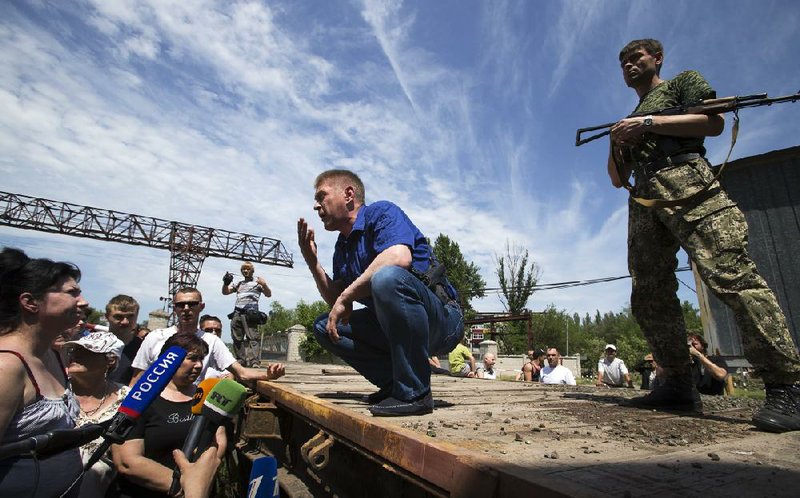SLOVYANSK, Ukraine -- From the country's richest man to citizens under fire, anger and dismay over Ukraine's eastern turmoil gained strength Tuesday, but pro-Russia rebels who have declared the region independent vowed defiance.
In Kiev, home to the central government that the separatists detest, lawmakers passed a memorandum that guaranteed the status of Russian as Ukraine's second official language and proposed government decentralization. While the document offered no specifics or time frame, Russia -- which long had pressed for both commitments -- offered words of guarded welcome.
"If what you are saying is true, this is the development we have been speaking about for the past months," Russian Deputy Foreign Minister Grigory Karasin was quoted as telling state news agency RIA Novosti.
In Mariupol, an eastern Ukrainian city that suffered fatal clashes this month between protesters and police, workers at a steel mill stopped their labor at noon as a siren blew. They gathered for a speech from the company's chief condemning the separatist movement known as the Donetsk People's Republic.
"We are here because Mariupol needs a peaceful sky above us. Tanks and guns have no place in our city," said mill worker Sergey Kulitsh.
The plant is part of the industrial empire of Rinat Akhmetov, regarded as Ukraine's richest man, who had called for his workers to attend noontime protests.
The tycoon vowed to challenge the insurgents who declared independence last week in the Donetsk and Luhansk regions, home to 6.5 million people.
"No one will frighten us, including those calling themselves a Donetsk People's Republic," Akhmetov said in a statement.
Last week, his company organized steelworkers to patrol alongside police in Mariupol. The move forced insurgents to vacate government buildings they had seized in the Black Sea port.
Ukrainian Interior Minister Arsen Avakov hailed Akhmetov's move as likely to "sweep the terrorist scum away better than any counterterrorist operation."
One rebel leader in Donetsk, Denis Pushilin, retaliated Tuesday by threatening to nationalize Akhmetov's businesses over his refusal to pay taxes to the separatists.
Ukraine is holding a presidential election Sunday, which the government in Kiev hopes will unite the country behind a new leader.
Separatists exchanged fire again Tuesday with government forces on the outskirts of Slovyansk -- the epicenter of the rebellion against the government -- as residents voiced their anger over the fighting.
Vyacheslav Ponomarev, the separatist leader in Slovyansk, met Tuesday with about 200 residents, who shouted at him to end hostilities.
Wearing a pistol on his belt and flanked by a bodyguard toting a Kalashnikov rifle, Ponomarev yelled back, saying he would pay compensation to repair damaged houses.
"Please, I implore you, do not panic!" he shouted. "If you do, you are playing into the hands of our enemies."
Russia's Defense Ministry, meanwhile, said army units were dismantling camps along the Ukraine border. Such withdrawal activity, if confirmed, would ease fears that the Kremlin was positioned to invade eastern Ukraine and seize the country's industrial heartland.
But the Pentagon and NATO, which estimates that Russia has 40,000 troops along the border, said they had no evidence of a Russian withdrawal. NATO spokesman Oana Lungescu challenged the Russians "to prove that they are doing what they are saying."
U.S. Vice President Joe Biden on Tuesday said countries in Europe "must remain resolute in imposing greater costs on Russia and imposing those costs together."
The U.S. and the European Union have imposed travel bans and asset freezes on President Vladimir Putin's inner circle over Russia's annexation of the Crimea Peninsula and threatened to target entire sectors of the Russian economy with sanctions if Russia tries to grab more land or attempts to derail Ukraine's presidential election.
"But our strategy is about more than just imposing costs. It's fundamentally about investing in a revitalized NATO that emerges from this crisis and works toward a successful summit in Wales stronger and more united," Biden said during a trip to eastern Europe.
Meanwhile, Putin met Tuesday with Chinese President Xi Jinping in a diplomatic boost for the isolated Russian leader, but the two sides had yet to agree on a widely anticipated multibillion-dollar natural gas sale.
The Russian leader is hoping to extend his country's dealings with Asia and diversify markets for its gas, which now goes mostly to Europe.
Russia has been negotiating for more than a decade on a proposed 30-year deal to supply gas to China. Officials said they hoped to complete work in time to sign a contract while Putin is in Shanghai. But Putin's spokesman, Dmitry Peskov, said Tuesday that it wasn't finalized.
Information for this article was contributed by Vladimir Isachenkov, John-Thor Dahlburg, Alison Mutler and Louise Watt of The Associated Press.
A Section on 05/21/2014


